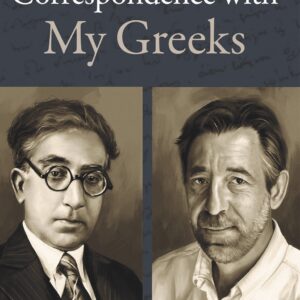Have you ever wondered where we get the idea of “idea”? Or of “conscience” or “pity” or “create”? Or wondered when words like “terrorize” or “democrat” or “capital” entered English?
If it hadn’t been for the coronavirus pandemic, I doubt I’d even be posing these questions. But for me, a plus of the pandemic has been that my local public library has been closed. Of course, in ways that’s a minus. But it forced me to browse my bookshelves for things to read. And this is how I came across Owen Barfield’s 1953 classic History in English Words.
I hadn’t read it for decades—not since it was a resource for a book I was writing on the history of some popular contemporary words. Re-reading it now, I cringed at my snooty young-adult marginalia. But I delighted in the riches in Barfield’s book.
“Delight” is in fact one of the hundreds of words whose history Barfield traces. It entered our language at that period when English was straddling the medieval religious worldview and the secular outlook of the pre-Renaissance era. During this in-between time, many words slid away from the Church and into love poetry: words like mercy, charity, passion, and pity (splitting off from piety). “We may think of them,” Barfield writes, “as gifts presented to the lyric lover by the Bride of Christ.”
The English lyric lover of the period received gifts from elsewhere as well. Petrarch and other continental love poets had already secularized a large amorous vocabulary, which came to England via the Normans: amorous itself, along with dalliance, pleasure…and delight.
But what especially fascinates me about this transitional time is how we got the word and concept of “conscience.” It came along, Barfield says, with a new awareness of the individual human soul and its inner life. I’d previously thought of this as a Renaissance development, but Barfield traces to the thirteenth century our English word conscience. Though it began then as an ecclesiastical term meaning something like an abstract “consciousness” (or “knowledge”), it “seems to have grown more and more real, until at last it became that semi-personified and perfectly private mentor whom we are inclined to mean today when we speak of ‘my conscience.’”
I hope you’re getting a sense, from my two quotations above, of how engaging Barfield’s own language is. He delights (yes) in creating metaphors for how words work—and play. Speaking of the third century B.C. translation of the Hebrew Scriptures into Greek (the Septuagint), he writes: “The harmless Greek word ‘eidolon’ (idol), which had formerly meant any sort of mental image…suddenly found itself selected from its fellows to be spit upon and cast into outer darkness. ‘Paradeisos’, on the other hand—the park of a Persian nobleman—was spirited away, as though by the four Djinnis of Arabian legend, first to the Garden of Eden and then to the heavens.”
Or this: “Slowly the divers of the Romantic expedition brought up to the surface of consciousness that vast new cosmos which had so long been blindly forming in the depths. It was a cosmos in which the spirit and spontaneity of life had moved out of Nature and into man.”
Which brings us to the Romantic Movement—which molded so many of our current meanings. It’s no surprise that Romanticism moved inspiration from a divine action (of the Holy “Spirit”) to something arising from within the human mind and spirit. Create made a similar move. Writes Barfield: “‘Creare’ was one of those old Latin words which had been impregnated through the Septuagint and the Vulgate with Hebraic and Christian associations; its constant use in ecclesiastical Latin had saturated it with the special meaning of creating, in divine fashion, out of nothing.” But for the Romantic poets, “the imagination was felt as creative in the full religious sense of the word.”
Which brings us to imagination. (Each of Barfield’s words does bring us to another; in fact, he organizes his chapters by word-clusters.) The history of imagination is intriguing to trace. From Latin “imago,” denoting anything subjective rather than objective, imagination was taken up in English by Chaucer, who used it for any mental image that lacks existence outside the mind. Chaucer used fancy interchangeably with imagination, as did most writers—until Coleridge made his famous distinction between the two.
And for this distinction I want to get Coleridge’s own words. So it’s back to my bookshelves, to pull out an anthology of Romantic writings which includes Coleridge’s 1817 philosophical prose work Biographia Literaria. And there in Chapter XIII, I find it:
“The Fancy is indeed no other than a mode of Memory… Fancy must receive all its materials ready made.”
Imagination, on the other hand, is more complex, indeed two-fold:
“The primary Imagination I hold to be the living Power and prime Agent of all human Perception, and as a repetition in the finite mind of the eternal act of creation in the infinite I Am. The secondary Imagination I consider as an echo of the former…differing only in degree, and in the mode of its operation. It dissolves, diffuses, dissipates, in order to re-create…. It is essentially vital.”
So for Coleridge, imagination is creative…which brings us back around to where we started with the Romantics.
And since I seem to be thinking here in loops, I should loop back to the opening questions of this post. Where do our concepts of “conscience,” “pity,” “create,” and “idea” come from? And how about the English words “terrorize,” “democrat,” and “capital”?
Conscience, pity, and create we’ve touched on. Terrorize and democrat we owe to the French Revolution (along with revolutionize). Capital was brought into English by the new financial institutions of the seventeenth century, along with commercial, discount, and investment.
And our idea of “idea”? From Plato, of course.
Peggy Rosenthal has a PhD in English Literature. Her first published book was Words and Values, a close reading of popular language. Since then she has published widely on the spirituality of poetry, in periodicals such as America, The Christian Century, and Image, and in books that can be found here.





